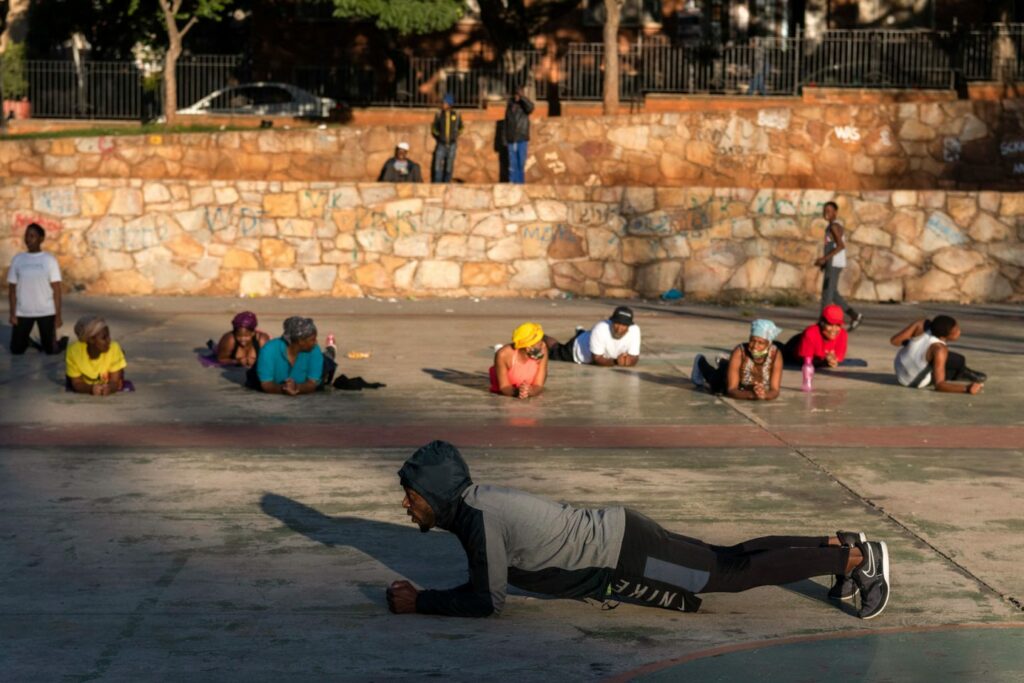Residents exercise in the early morning at Berea Park in the Johannesburg inner-city suburb of Berea. (Ihsaan Haffejee/New Frame)
From the beginning, the coronavirus showed a penchant for overstepping biomedical boundaries. The bristling, nanometre-wide ball with lethal barbs is both infectious disease and confirmation that humans and pathogens don’t occupy different worlds. We aren’t in here and it out there; rather, we are caught up in an intimate cohabitation.
 An early morning game of basketball played in the shadow of Ponte Tower. (Image: Ihsaan Haffejee)
An early morning game of basketball played in the shadow of Ponte Tower. (Image: Ihsaan Haffejee)
Covid-19 infections have been as social as they have been individual. They have caught us at our most beautiful (scientists cannot agree yet whether the virus is transmitted through people singing), laid low our worship and even legislated our mourning.
But as the virus choked our social worlds, it also, improbably, gave cause for new life.
Under level four of the Covid-19 lockdown, residents of Johannesburg’s high-rise neighbourhoods of Hillbrow and Berea turned their strained affinity with the coronavirus from destruction to creation. For the three hours allowed for public exercise every morning from 6am to 9am, they transformed inner-city parks into kaleidoscopes of activity.
Early-morning constellations
In Ponte Tower’s iconic shadow, the members of a class of about 50 began their mornings stationed 1.5m apart along the perimeter of the Berea Park basketball courts. And, like satellites orbiting the courts, joggers circled them — some in the neon, reflective gear of seasoned runners; many in the muted exercise kits of someone trying this for the first time.
Thami Ntshalintshali, a regular on the outdoor gym equipment in the park’s northeast corner, said he had never seen Berea Park like this. Full to the brim. A cacophony of footfall and laughter. In use.
 Thulani Khupe leads people in an early morning exercise routine in Berea, Johannesburg. (Image: Ihsaan Haffejee)
Thulani Khupe leads people in an early morning exercise routine in Berea, Johannesburg. (Image: Ihsaan Haffejee)
At the heart of Berea Park’s level-four mornings was a stringy Zimbabwean man with a whistle swinging from his neck. Thulani Khupe was young when he first learned to exercise. His father, a heavyweight boxer in Bulawayo, would wake him for early-morning jogs and core workouts. Later in the day, Khupe would show his classmates the moves he had learnt. He hasn’t stopped teaching.
“The economy is not right. These people aren’t working,” he said of the free pilates-style classes he was offering to his Berea and Hillbrow neighbours during the lockdown.
One of his newest students, Bongiwe Ncube, struggled to make it through her first session, which, as with most of Khupe’s classes, focused on balance. Somehow managing a smile through her stiffness, the chef at the University of the Witwatersrand explained that she was there for support. “Sometimes when you’re alone, you take shortcuts,” she said. “At least now I have others. They inspire me to keep moving.”
Another student on her way home after the class, Nomathemba Ngoni, who ordinarily works at a Parkhurst florist, said: “My body felt heavy before. I had not exercised for a while. But my body is feeling happy again.”
The new normal
In the neighbourhoods around the park, prospects for work are often as threadbare as tenancy in the inner city. For many, the lockdown only loosened already flimsy footholds on the city. And for two hostesses at Monte Casino restaurants, it had been especially cruel. Neither Mbali Tshabalala nor Nonhlanhla Mbethe had received a lockdown pay cheque by the time they found out their employers had not registered them with the Unemployment Insurance Fund.
The two friends turned to Berea Park to escape the uncertainty that had crept into their flat, a few blocks away. “It’s a new habit,” said Mbethe. “And in that way we’re grateful.” The two were adamant that their new habit, which begins on the park’s gym equipment before a skipping routine and some jogging, will survive the coronavirus.
 Residents otherwise stuck inside small flats in the inner city of Johannesburg make use of the outdoor gym facilities during the morning exercise window. (Image: Ihsaan Haffejee)
Residents otherwise stuck inside small flats in the inner city of Johannesburg make use of the outdoor gym facilities during the morning exercise window. (Image: Ihsaan Haffejee)
If the Covid-19 lockdown fixed Joburg in place, it turned its inner-city parks into public spaces for motion and joy. Whatever “new normal” is established in the coming months and years, these three neon hours under level four, when the inner-city residents could turn away from the nightmare that was towards a dream that might be, should be celebrated.
This article was originally published by New Frame.